Best 18 Scala Developers
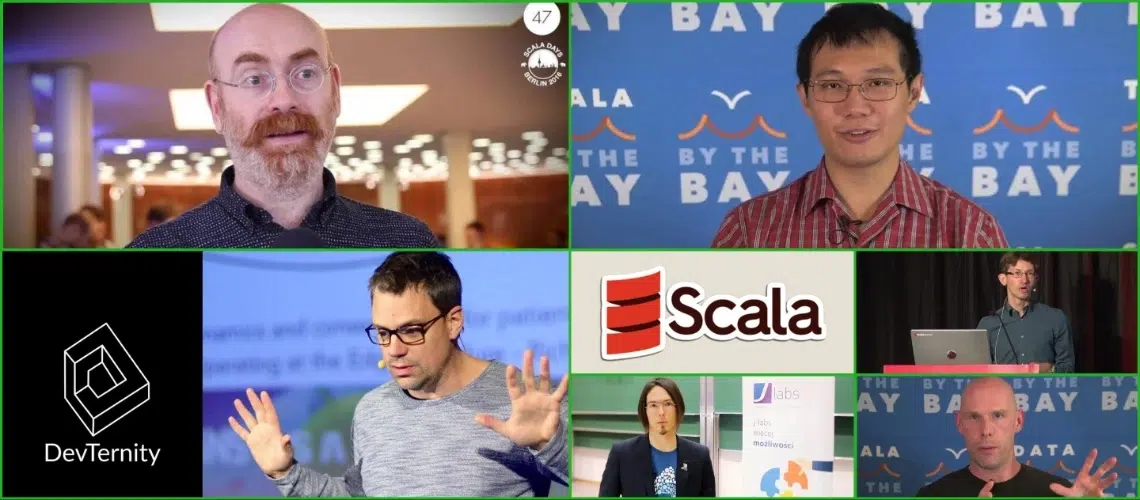
Scala has a vibrant community of developers pushing the language and ecosystem forward.
Below is a curated list of the best Scala developers – people who are leading open-source projects, founding Scala-centric startups, influencing the tech community through blogging or speaking, contributing at major companies or even excelling in programming competitions. These individuals span the globe and a mix of roles (from academics and CTOs to independent contributors), reflecting Scala’s worldwide impact.
- Jonas Bonér
- Martin Odersky
- Li Haoyi
- Matei Zaharia
- Adam Warski
- Miles Sabin
- Denys Shabalin
- John A. De Goes
- Neha Narkhede
- Viktor Klang
- Sébastien Doeraene
- Marius Eriksen
- Alexandre Archambault
- Konrad Malawski
- Heather Miller
- Swastik Mohanty
- Daniel Spiewak
- Ólafur Páll Geirsson
Now, let’s dive into each of these Scala luminaries and see why they stand out:
Jonas Boner

Without Resilience, Nothing Else Matters.
Nationality: Swedish
Jonas co-founded Lightbend (Typesafe) in 2011 alongside Martin Odersky and others, with the mission to build a “Reactive” runtime for Scala.
He is best known as the creator of the Akka toolkit – Scala’s popular library for building concurrent, distributed, and resilient message-driven applications. Akka’s actor model and streaming APIs, originally authored by Bonér, have influenced countless distributed systems. Jonas also co-authored the Reactive Manifesto, cementing his thought leadership in responsive system design. After years as Lightbend’s CTO (and even Deputy CEO), he spun off Akka into its own company, where he continues as CTO and Chairman, actively guiding Akka’s development and ecosystem.
Bonér scores highly across multiple criteria. He has made major open-source contributions (Akka) that underpin many Scala systems, led a startup (Lightbend/Akka Inc.) while still coding, and influenced the broader tech community’s approach to system architecture (through the Reactive Manifesto and talks). In 2024, Jonas is still at the helm of Akka’s evolution – for example, Lightbend’s platform was recently rebranded entirely around Akka, highlighting his enduring impact. His blend of technical innovation and entrepreneurial leadership makes him a top Scala developer to watch.
- Linkedin: Jonas Bonér
- X (Twitter): @jboner
- Github: jonas
- Website/Blog: jonasboner.com
Martin Odersky
Scala is about unifying object-oriented and functional programming. We don’t want to replace one paradigm with the other — we want the best of both.
Nationality: Swiss
Martin is the creator of the Scala programming language and one of its ongoing stewards.
A veteran language researcher (and co-designer of Java generics and the original javac compiler), Odersky has devoted the last two decades to designing and refining Scala. He continues to oversee Scala’s evolution (he spearheaded the release of Scala 3 in 2021) as head of the programming group at EPFL and as academic director of the Scala Center. Martin’s vision of unifying object-oriented and functional programming in a statically typed language became reality with Scala, which has since grown into a global open-source tool and industrial staple. His influence is felt in every Scala release and the countless developers he’s taught through his books and Coursera courses.
As Scala’s inventor, Odersky is unquestionably one of its top developers – he not only wrote the first Scala compiler, but also guides the language’s future. He remains actively involved in language design decisions and mentoring the core team. His dedication to education (e.g. Programming in Scala book and online courses) has brought many new developers into the Scala fold. Simply put, without Martin, Scala would not exist.
- Linkedin: Martin Odersky
- X (Twitter): @odersky
Li Haoyi
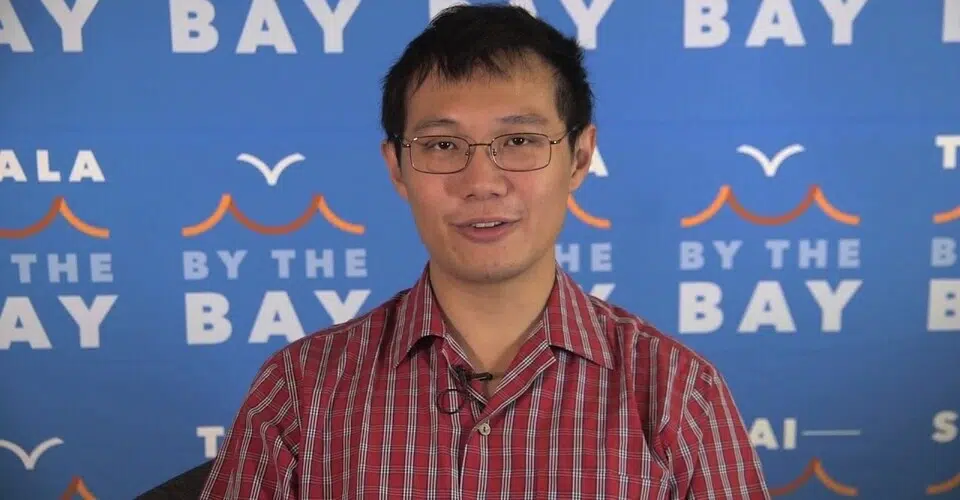
Nationality: Singaporean
Li is a Scala open-source contributor and author of many widely used tools.
An MIT graduate, Haoyi has created projects that span interactive REPLs, web frameworks, build tools, and more. He’s the primary developer of Ammonite (an enhanced Scala REPL and scripting environment) and Mill (a fast Scala build tool), among other libraries for JSON parsing (uPickle), HTML templating (ScalaTags), OS interfacing (OS-Lib), pretty-printing, etc. Collectively, his projects have over 10,000 GitHub stars and millions of downloads per month. Li Haoyi was also an early contributor to Scala.js (Scala’s JavaScript transpiler) and has been an outspoken advocate for making Scala more approachable. He regularly shares insights on his blog and has written the book Hands-on Scala Programming to help developers learn the ecosystem.
Haoyi is considered a “one-man Scala army” for the sheer breadth and impact of his contributions. His libraries fill crucial gaps and are praised for their usability and performance, inspiring many Scala developers. For example, Ammonite has made using Scala in scripting and notebooks much easier. In the broader community, he’s known for pragmatic takes on Scala’s direction (often spurring healthy debate on functional vs. practical Scala). As of today, he continues to update his tools and share knowledge. Li Haoyi’s sustained output and influence on everyday Scala development easily earn him a spot among the top Scala devs.
- Linkedin: Li Haoyi
- X (Twitter): @li_haoyi
- Github: lihaoyi
- Website/Blog: lihaoyi.com
Matei Zaharia
Nationality: Canadian (born in Romania)
Matei is a prominent figure in big data and distributed computing, best known as the original creator of Apache Spark. Spark, which Matei started during his Ph.D. at UC Berkeley in 2009, is a unified analytics engine written in Scala that has become one of the most widely used open-source projects in big data.
After open-sourcing Spark, Matei co-founded Databricks in 2013 to commercialize it and continue its development. He remains Databricks’s Chief Technologist (CTO) and has led the creation of other important Scala-based projects like Delta Lake (data lake storage) and MLflow (machine learning lifecycle management). In parallel, Matei is a computer science professor, ensuring a pipeline of new ideas (e.g., his recent research on integrating large language models with external data).
Matei’s contributions fulfill multiple criteria: Spark is a monumental open-source contribution (with much of its core in Scala) that significantly boosted Scala’s popularity in industry. As a startup founder (Databricks now a $10+ billion company), he exemplifies technical leadership while still contributing code – it’s not uncommon to see Matei live-demo new Databricks features by committing Scala code on stage. He’s also received prestigious recognitions (ACM Dissertation Award, etc.), reflecting the impact of his work. Matei continues to drive innovation in the Spark ecosystem (e.g., pushing Spark 3+ optimizations, Databricks’s AI initiatives) and remains one of the most influential Scala practitioners in the world.
- Linkedin: Matei Zaharia
- X (Twitter): @matei_zaharia
- Github: mateiz
Adam Warski
Nationality: Polish
Adam is a co-founder of SoftwareMill, a Poland-based software consultancy known for its Scala expertise.
Uniquely, Adam has remained a hands-on developer while leading the company’s technical direction. He has created numerous open-source libraries that many Scala developers use. To name a few: Quicklens (for updating deeply nested case class fields easily), MacWire (a lightweight compile-time dependency injection library), ElasticMQ (a Scala implementation of Amazon SQS), and Sttp & Tapir (Scala HTTP client and API endpoint schema libraries). Adam is also an avid blogger – his “Beyond Java” blog and SoftwareMill’s tech blog feature many Scala posts – and a frequent speaker at conferences like Devoxx and ScalaDays.
Adam exemplifies the entrepreneurial Scala developer who hasn’t stopped coding. His libraries address practical problems (e.g., Quicklens has a “particularly high usability/size ratio” by his own modest admission). Through SoftwareMill, he’s mentored a team that contributes back to Scala (SoftwareMill folks maintain many OSS projects). Adam continues to push Scala in areas like APIs and cloud integration (Tapir is becoming a go-to solution for describing HTTP endpoints in Scala, and he’s actively maintaining it). For his sustained open-source output, leadership in industry, and community engagement, Adam Warski is certainly among the top Scala developers to follow.
- Linkedin: Adam Warski
- X (Twitter): @adamwarski
- Github: adamw
Miles Sabin
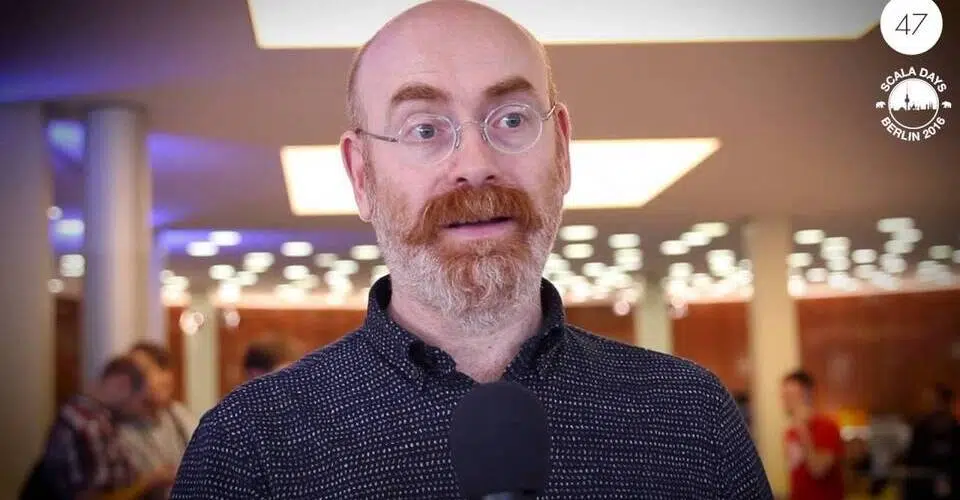
Nationality: British
Miles is a legendary Scala contributor known for his work on Scala’s type system and generics. He’s the author of Shapeless, a library that unlocked advanced generic programming in Scala, enabling features like automatic derivation of type class instances and “compile-time reflection.”
Shapeless has been so influential that many of its concepts (e.g. HLists, union types) helped shape Scala 3’s new features. Miles is also a co-founder of the Typelevel initiative (a community-driven effort for principled, purely functional Scala libraries) and served on the Scala Improvement Process committee. He has contributed directly to the Scala compiler as well – for instance, he helped add literal types to Scala 2.13, extending the type system’s expressiveness. As a consultant and trainer (Underscore.io), Sabin has mentored many Scala developers and continues to speak at Scala conferences worldwide.
Sabin’s influence on Scala is deep and enduring. Through Shapeless, he expanded what Scala’s type system could do, inspiring a generation of libraries (and even changes in Scala 3). His role in co-founding Typelevel demonstrates leadership in community-building around open-source. Miles remains very active: he’s collaborating on new Scala 3 libraries (recently the “Soundness” direct-style library suite) and is a go-to expert for any advanced Scala type magic. His dedication over 10+ years, from open-source code to education and community, firmly places him among the top Scala developers.
- Linkedin: Miles Sabin
- X (Twitter): @milessabin
- Github: milessabin
Denys Shabalin
Nationality: Ukrainian
Denys is the primary creator of Scala Native, the ahead-of-time compiler that allows Scala to run without a JVM.
Scala Native uses LLVM to compile Scala code to machine code, enabling small, fast programs useful for systems scripting, command-line tools, or platforms where the JVM is impractical. Denys developed Scala Native as a research project at EPFL, and it reached v0.4 in recent years with increasing community usage. He has also worked on other Scala compiler internals and was involved in projects like Scala “Hygienic” macros during his academic tenure. After EPFL, Denys joined Google, where he has been contributing to Scala tooling in the open-source realm (for example, improvements to Scala’s build and test infrastructure). He remains an active Scala Native maintainer and often assists with questions about low-level performance in Scala.
Denys Shabalin represents the cutting-edge innovators in the Scala community. By enabling Scala on new platforms (native and possibly WASM), he expanded the language’s horizon. Scala Native is still evolving, but its existence is important for Scala’s competitiveness with languages like Go or Rust in certain domains. Denys also demonstrates global diversity in Scala leadership (a Ukrainian developer making global impact). Scala Native is on the cusp of a 1.0 release, with Denys guiding core design (like garbage collection strategies and interoperability with C). His expertise in compiler and runtime engineering, plus the significance of his project, make Denys one of Scala’s top developers to watch.
- Linkedin: Denys Shabalin
- Github: densh
John A. De Goes
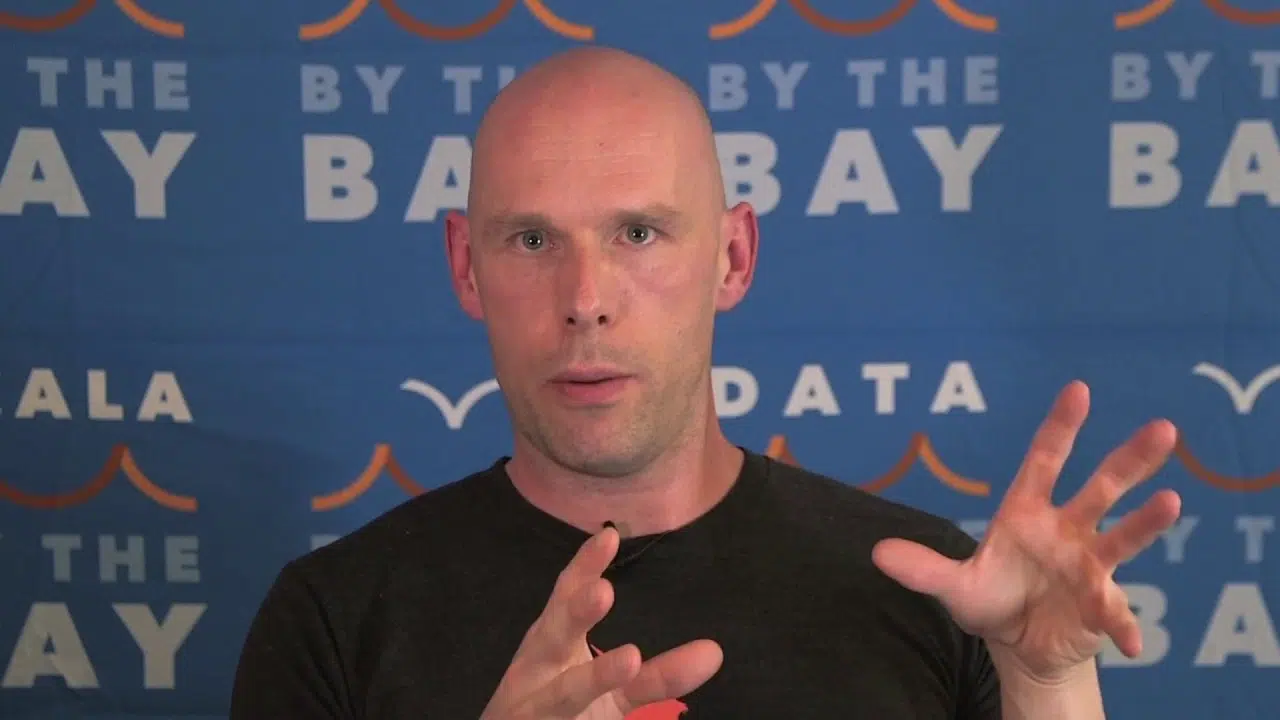
Nationality: American
John is a prominent figure in the Scala functional programming community. He is the original creator of ZIO (a zero-dependency, high-performance Scala library for asynchronous and concurrent programming with type-safe effects).
ZIO has gained a huge following as an alternative to older effect libraries, and has a vibrant ecosystem of its own. John is also a serial entrepreneur – currently founder and CEO of Ziverge, a company that supports ZIO’s development and provides consulting/training. In the past, he led engineering at SlamData, where he used Scala for data analytics software. He’s a frequent speaker at Scala and functional programming conferences, known for passionate talks advocating simple, pragmatic FP. Through Ziverge, John launched initiatives to grow the Scala community, such as the ZIO Meetup Speaker Program to empower new speakers.
John De Goes stands out for balancing code contributions, community leadership, and entrepreneurship. On the open-source side, ZIO (which he continues to drive) is one of the most significant Scala projects in recent years, influencing the design of Scala 3’s future effect system. He actively engages with the community, whether through mentoring contributors, blogging his Scala journey, or organizing the annual Functional Scala conference. John’s work also spans major competitions – while not an algorithm competitor himself, he has hired ICPC medalists to work on ZIO, bridging that world with Scala. As of today, he’s pushing Scala into new domains (even exploring cloud programming models via ZIO). His impact across multiple fronts makes him one of Scala’s top developers to watch.
- Linkedin: John A. De Goes
- X (Twitter): @jdegoes
- Github: jdegoes
- Website/Blog: degoes.net
Neha Narkhede
Nationality: Indian
Neha is a technologist-turned-entrepreneur best known as a co-creator of Apache Kafka, the distributed streaming platform.
Early in her career as a software engineer at LinkedIn, Neha helped develop Kafka (written in Scala) to handle LinkedIn’s activity stream data. In 2014, she co-founded Confluent, the company behind Kafka, where she served as CTO and led its technical roadmap. Under her leadership, Kafka (and its Kafka Streams API in Scala) became an industry standard, now used by over 80% of Fortune 500 companies. Neha has since stepped back from Confluent’s daily operations (remaining on its board) to start a new fintech company, but she continues to be an influential voice in streaming data technology. She has received numerous recognitions, such as being named in Forbes’s Top 50 Women in Tech and MIT Tech Review’s Innovators Under 35.
Neha brings a powerful mix of open-source contribution and enterprise impact. By co-authoring Kafka’s design and implementation in Scala, she directly contributed one of the most important Scala-based systems in production. As a startup founder (and one of the few female founders in the Scala ecosystem), she demonstrated how Scala can scale to unicorn-status business success. Even though she’s now focused on a new venture (Oscilar) in fraud prevention, her legacy with Kafka and ongoing thought leadership in data streaming keep her firmly among the top Scala figures. Neha’s story also showcases Scala’s global reach – from Pune, India to Silicon Valley – inspiring developers worldwide.
- Linkedin: Neha Narkhede
- X (Twitter): @nehanarkhede
Viktor Klang
Nationality: Swedish
Viktor is a respected expert in concurrent and reactive programming on the JVM. As Lightbend’s Deputy CTO for many years, he worked closely on Scala’s concurrency libraries and best practices.
Viktor was a longtime core contributor to Akka (he wrote Akka’s Futures library and helped align Scala’s Future/Promise APIs) and co-founded the Reactive Streams initiative along with Konrad Malawski and others. Many in the Scala community know Viktor for his helpful online presence (he often answered questions on mailing lists and forums) and his informative talks on concurrency, back-pressure, and stream processing. In recent years, he transitioned to working on the core Java team at Oracle, where he applies his knowledge to influence the Java platform’s concurrency features (Project Loom, etc.). He remains an active voice in the community, occasionally blogging and tweeting about improvements to developer experience and performance.
Viktor has been a key Scala influencer from the early 2010s to today. He not only wrote critical pieces of Scala’s ecosystem (Akka, scala.concurrent package) but also helped shape industry standards (Reactive Streams, which became java.util.concurrent.Flow in JDK 9). This cross-pollination of Scala ideas into Java’s core is a testament to his impact. Even though his focus now includes Java, he still identifies as a Scala developer at heart – and when he speaks on concurrency, both Scala and Java audiences listen. His combination of deep technical skill and community mentorship justifies his place among the top Scala developers of today.
- Linkedin: Viktor Klang
- X (Twitter): @viktorklang
- Github: viktorklang
- Website/Blog: viktorklang.com
Sebastien Doeraene
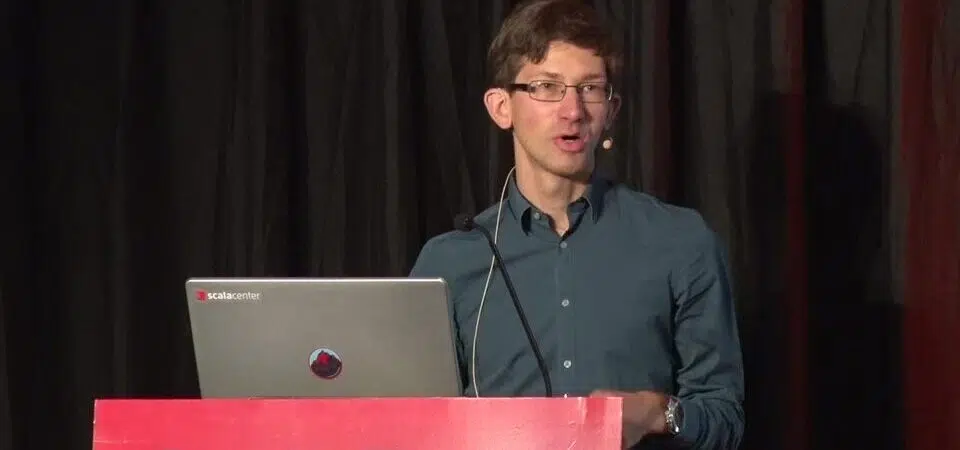
Nationality: Belgian
Sébastien is best known as the author of Scala.js, the Scala-to-JavaScript compiler that allows Scala code to run in web browsers.
Scala.js opened up front-end and full-stack development to Scala programmers, and Sébastien has led the project from its inception through a decade of improvements (Scala.js celebrated its 1.0 in 2020). He is a compiler/runtime expert who completed his PhD under Martin Odersky. In addition to Scala.js, Sébastien has contributed to Scala 3’s compiler and tooling. He later stepped into a leadership role as the Executive Director of the Scala Center (an organization that coordinates community-driven Scala education and open-source), where he guides initiatives to boost Scala’s adoption and sustainability.
Sébastien exemplifies open-source technical excellence. Scala.js is a tour de force that significantly expanded Scala’s ecosystem, and he’s “best known” for this achievement. By compiling Scala to JavaScript and even WebAssembly, Scala.js has kept Scala relevant in the web era. Doeraene’s influence also comes through mentoring and decision-making: as Scala Center director, he balances community needs with language evolution. He remains very active – for instance, working on interoperability between Scala.js and new JS features, and advocating for Scala in academic circles. His dedication lands him solidly among the top Scala developers of the moment.
- X (Twitter): @sjrdoeraene
- Github: sjrd
Marius Eriksen
Nationality: American
Marius is the engineer behind much of Twitter’s success with Scala. He created Finagle, Twitter’s RPC framework for building microservices, which is written in Scala and has powered Twitter’s backend for a decade.
Finagle introduced many developers to functional programming concepts (it uses futures, services, and filters in a very Scala-esque way). Marius also authored the famous “Effective Scala” guide at Twitter, a set of Scala best practices that many teams inside and outside Twitter adopted. During his time at Twitter, he served as a Principal Engineer and chaired the Architecture Group, influencing system design at scale. Marius’s work on Finagle and the related Twitter Util libraries laid the groundwork for high-performance, resilient services in Scala. He has since moved on to other challenges (working on security and reliability at Stripe, as of last known info), but Finagle is still actively used and maintained.
Marius Eriksen is a prime example of a “major tech company Scala contributor”. By building Finagle and Twitter’s server infrastructure in Scala, he proved Scala’s viability in large-scale, latency-critical environments. The fact that “Twitter’s whole infrastructure [was] in Scala” and Effective Scala distilled that experience is largely thanks to Marius’s leadership. Developers who use Finagle, Finatra (Twitter’s web framework), or even just the concept of futures in Scala owe something to his work. As of today, Finagle (and its spin-offs like Finatra and Finch) remains a reference for building microservices, and Marius’s design principles continue to spread (for example, through Finagle’s influence on libraries like Facebook’s Swift). His legacy and ongoing work easily qualify him for this top 25 list.
- Linkedin: Marius Eriksen
- X (Twitter): @marius
- Github: mariusae
Alexandre Archambault
Nationality: French
Alexandre has had a tremendous impact on Scala tooling. He is the creator of Coursier, the pure-Scala dependency resolver and artifact fetcher that drastically sped up builds and replaced Ivy in many contexts.
If you’ve used Scala, chances are Coursier was downloading your libraries behind the scenes. Alex is also the lead developer of Scala CLI, a new all-in-one command-line tool that simplifies running and packaging Scala code (including scripting and REPL use-cases). Additionally, he’s contributed to projects like Ammonite and the Almond Scala Jupyter kernel. In short, Archambault builds the tools that make Scala developers productive from day one. He currently works with VirtusLab (and previously with the Scala Center) focusing on open-source tooling.
Archambault scores highly in open-source contributions — his work arguably touches every Scala developer (through Coursier, which is now default in SBT, Mill, etc.). The community explicitly recognizes that “he has written arguably some of the most widely used tools in the Scala ecosystem”. He also stands out for improving Scala’s approachability: Scala CLI and Almond make it easier to start using Scala without complex setup. Alex is actively working on Scala CLI’s evolution and other developer experience improvements. His behind-the-scenes influence on daily development earns him a well-deserved spot on this list.
- X (Twitter): @alxarchambault
- Github: alexarchambault
Konrad Malawski
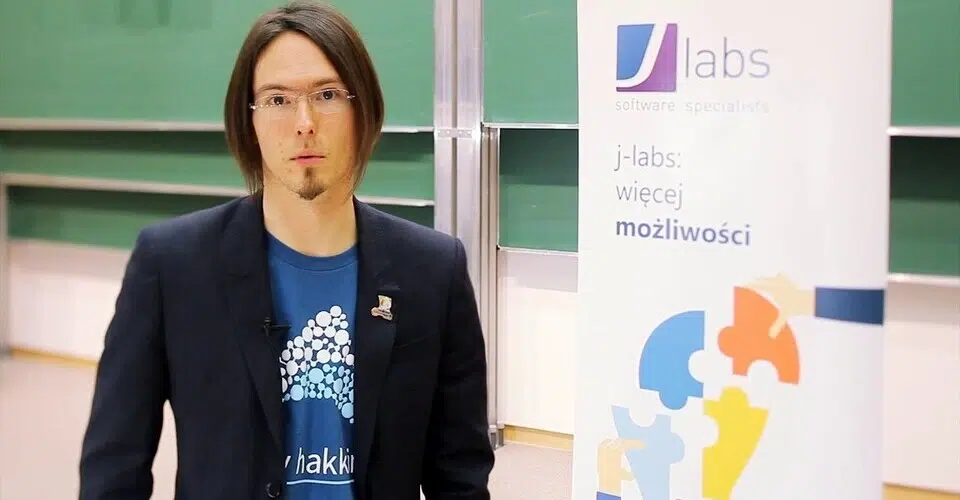
Nationality: Polish
Konrad “ktoso” made his mark as a core Akka team member and co-author of the Reactive Streams specification.
During his years at Lightbend, Konrad maintained critical parts of the Akka ecosystem – including Akka Cluster, Akka Persistence, Akka Streams, and Akka HTTP. He was instrumental in Akka’s implementation of the Reactive Streams initiative, and even became a Java Champion for pushing these ideas into the Java standard library. In recent years, Konrad moved to Apple’s Swift language team, applying his expertise to build concurrency and distributed features in Swift. However, he remains involved with Akka as an advisor and continues to engage with the Scala community (often seen giving talks at conferences like FOSDEM, where he might present on Java & Swift interoperability while still championing lessons learned from Scala).
Konrad’s inclusion highlights a developer who straddles open-source and industrial contributions. He helped build one of Scala’s cornerstone frameworks (Akka) and ensured its ideas were heard at the top levels of the industry (influencing both Java and Swift). A competitive programming alum in his youth, he brings that performance mindset to frameworks used by many high-volume systems. He actively interacts with Scala user groups and contributes to Akka when big changes (like new licensing or Akka’s platform spin-off) occur. Konrad’s dedication to reactive principles and his ongoing cross-language influence secure his spot among the top Scala devs.
- Linkedin: Konrad Malawski
- X (Twitter): @ktosopl
- Github: ktoso
Heather Miller
Nationality: American
Heather is a prominent Scala educator and community builder. She co-founded the EPFL Scala Center in 2016 and was its first Executive Director, setting up a non-profit structure to support Scala’s open-source development and education.
Heather earned her PhD under Martin Odersky, during which she contributed to Scala (particularly in the area of Scala’s asynchronous programming – she worked on improving Futures and distributed programming models). She was instrumental in creating Coursera’s “Functional Programming in Scala” MOOC, which has taught tens of thousands of students. After EPFL, Heather joined academia in the US, becoming a professor at CMU where she continues research on distributed systems and programming languages (often using Scala as the vehicle). She remains involved in Scala community outreach and initiatives to improve diversity and inclusion in open source.
Heather Miller brings a unique combination of technical and community contributions. While not as a coder as some others on this list, her impact on Scala adoption and sustainability is immense – from co-authoring Scala improvement proposals to organizing developer conferences. She literally helped shape the “center” of the Scala community. Heather’s focus is on research (e.g. she’s exploring new concurrency paradigms that might influence future Scala) and on nurturing the next generation of programmers (her students often end up contributing to Scala projects). For her leadership in education and community (especially as a woman leader in a male-dominated field), Heather is unquestionably one of the top Scala figures of the past and coming years.
- Linkedin: Heather Miller
- X (Twitter): @heathercmiller
Swastik Mohanty
Nationality: Indian
Swastik is a Data & Cloud Solution Architect and senior technical lead who works extensively with Scala across Spark-based data pipelines and microservices.
He focuses on building complex data flows with Spark SQL and Structured Streaming, integrating Kafka, and developing migration and API frameworks in Scala to support real-time analytics. He also shares Scala know-how publicly, including an article on the advantages of Scala’s singleton and companion objects. In enterprise settings, he applies Scala with Spring Boot and microservices patterns to design resilient, high-throughput data platforms. He mentors engineering teams on Scala, emphasizing type safety, pattern matching, and clear module boundaries to improve maintainability.
His recent work includes optimizing Spark-on-Kubernetes jobs written in Scala for both batch and streaming use cases on AWS.
- Linkedin: Swastik Mohanty
Daniel Spiewak
Nationality: American
Daniel is a veteran Scala developer and a driving force in the Typelevel functional programming ecosystem. He has been a key contributor (and often maintainer) for libraries like Cats (functional programming abstractions for Scala) and Cats-Effect (for IO and concurrency control).
He’s also known for creating Circe (a popular JSON library for Scala) and Doobie (a functional JDBC layer) in their early days, and for running projects like Catbird (integrations between Twitter’s Finagle and Cats). Beyond code, Daniel is famous for his clear and compelling talks and blog posts that demystify complex FP concepts – his presentations on effect systems and reasoning about purity have been influential (“The Case for Effect Systems” is a recommended watch for Scala FP enthusiasts). In industry, Daniel’s career has spanned big companies (Disney Streaming, Verizon) and startups; he recently received an award as a “Graduate of the Last Decade” from his alma mater for his achievements in software, and he currently works on large-scale AI infrastructure at NVIDIA.
Daniel Spiewak is regarded as a thought leader in the Scala community. He has been contributing to Scala open source since the late 2000s and helped shape the Functional Scala movement (co-founding Typelevel, advocating for pure FP libraries). Many top Scala engineers cite Daniel’s blog or talks as what helped them “get” functional programming. In 2024, although he’s busy in the AI world, he still finds time to shepherd Cats-Effect releases and engage in language design discussions (for example, providing feedback on Scala 3’s effect capabilities). His sustained influence on Scala’s best practices and library design merits inclusion on this list.
- Linkedin: Daniel Spiewak
- X (Twitter): @djspiewak
- Github: djspiewak
Olafur Pall Geirsson
Nationality: Icelandic
Ólafur is one of the most influential Scala tooling developers of the last decade. He is best known for Metals, a Scala language server that brought modern IDE features to editors like VS Code, Vim, and Emacs, and became a key part of the day-to-day Scala workflow for many teams.
He has also been closely associated with scalameta-based tooling, and his public work includes maintaining or contributing to developer tools such as scalafmt and scalafix, which help standardize formatting and automate safe refactors across codebases. His personal site positions him clearly as a developer focused on compilers, build tools, and IDEs, and his GitHub profile reflects sustained contributions to these areas.
- Linkedin: Ólafur Páll Geirsson
- X (Twitter): @olafurpg
- Github: olafurpg
Wrap Up
These experts represent exceptional talent, making them extremely challenging to headhunt. However, there are thousands of other highly skilled IT professionals available to hire with our help. Contact us, and we will be happy to discuss your hiring needs.
Note: We’ve dedicated significant time and effort to creating and verifying this curated list of top talent. However, if you believe a correction or addition is needed, feel free to reach out. We’ll gladly review and update the page.
Frequently Asked Questions
Scala adoption has slowed compared to its peak, but it is still actively used. It remains important in data engineering, backend systems, and distributed computing, particularly where strong functional programming and JVM compatibility are required.
Scala consultants typically charge between $60 and $120 per hour depending on experience, project scope, and region. Rates are generally higher in North America and Western Europe, while Eastern Europe and Latin America offer more competitive pricing.
A Scala expert should have strong skills in functional and object-oriented programming, experience with frameworks such as Akka, Play, or Spark, and knowledge of building scalable distributed systems. Contributions to open-source projects are also a good indicator of expertise.
You can hire Scala developers through IT staffing firms, freelance platforms like Toptal and Upwork, or specialized consulting agencies focused on data engineering and backend development. Reviewing experience with large-scale data or financial systems helps in selecting the right candidate.
Scala is used by companies such as Twitter, LinkedIn, Netflix, and The Guardian, as well as many enterprises in finance, data analytics, and telecom.
